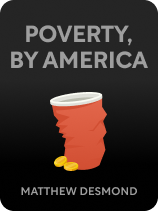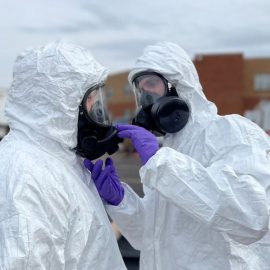
What does it feel like to be poor? What aspects of poverty can’t be quantified?
It’s easy to regard poverty as a black-and-white, by-the-numbers matter. But, according to Matthew Desmond, poverty is far more than that. It’s a tangible experience he knows firsthand, and he argues that it’s important for policymakers (and everyone else) to look beyond the numbers.
Keep reading to understand the lived experience—and the consequences—of poverty from Desmond’s perspective.
Matthew Desmond on Poverty as an Experience
The US federal government defines poverty in 2023 as an individual earning less than $14,580 per year or less than $30,000 for a family of four. But, poverty is far more than just a lack of income and can’t be reduced to a simple math equation. To truly understand the phenomenon of poverty in America, it’s crucial to explore what it actually feels like to be poor.
For Matthew Desmond, poverty is a personal matter. He writes that it is a complex state of being, encompassing a multitude of experiences, emotions, and consequences that go far beyond financial hardship. Desmond stresses that poverty is a wrenching, soul-crushing experience, imbued with physical and psychic pain, representing a loss of freedom, agency, choice, and options for those ensnared by its grasp.
The consequences of poverty are dire and far-reaching. It leads to premature death, illness, drug addiction, violence, homelessness, and sexual abuse and assault. It is the common thread that connects America’s social problems, contributing to issues such as lack of education, health disparities, and crime.
(Shortform note: Some writers challenge Desmond’s argument that poverty is the primary and direct cause of these social issues, claiming that it’s an oversimplification to attribute them solely to economic deprivation. Instead, these writers stress that personal choices significantly influence these social problems, with drug addiction and criminal activity often resulting from individual decisions rather than economic status. Individuals have agency in making choices that can lead to better outcomes despite challenging economic circumstances. Similarly, cultural factors, such as family structure, social values, and community support, can be even more influential than poverty in determining outcomes related to crime, education, and health.)
| The Non-Economic Cost of Poverty Desmond notes that the agonizing cost of poverty extends far beyond a lack of financial resources. Other scholars have explored the non-economic costs of poverty, particularly the additional stress, pain, and worry and the heavy toll it takes on well-being and psychological health. Indeed, research shows that stress levels in the United States are higher on average than in Latin America, with the gap between the rich and poor being notably wider. The poor in the US experience the highest levels of stress—associated with an inability to plan for the future, lower life satisfaction, and poorer health outcomes. Pain, worry, sadness, and anger are more prevalent among low-income individuals, while overall life satisfaction is significantly lower. Discrimination exacerbates the stress and challenges low-income individuals face, even affecting maternal health and birth outcomes—perpetuating disadvantage across generations. |

———End of Preview———
Like what you just read? Read the rest of the world's best book summary and analysis of Matthew Desmond's "Poverty, by America" at Shortform.
Here's what you'll find in our full Poverty, by America summary:
- Why the United States suffers from so much poverty and inequality
- How some Americans benefit from the poverty of others
- How we can empower the poor and eradicate poverty






